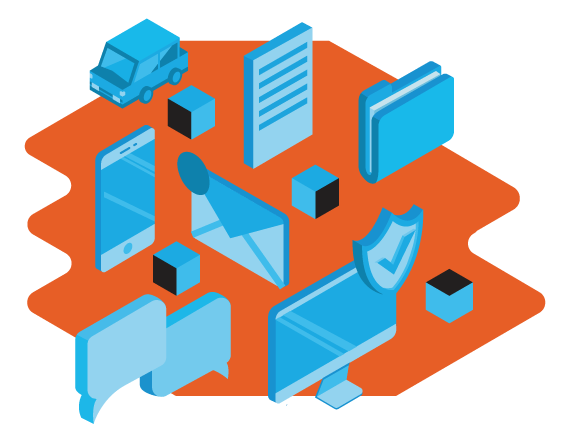
INSURANCE NERDS
BLOG
Simple Steps you can Take to Protect Your Business From Cyber Scams
October is Cyber Security Awareness Month and Fulcro has teamed up with Onuvo to share very valuable and relevant information that can help keep you informed on common cyber-related risks you, and your business may face.
WHAT IS CYBER SECURITY AWARENESS MONTH?
Cybersecurity Awareness Month raises awareness on the importance of cybersecurity across our Nation.
THE CYBER BASICS
Our lives are tied to so many digital interactions that make everyday activities easier for us. We pay bills online, receive instant messages, and stay connected with our friends and family.
That is why it is so important to promote education about the cyber scam trends that can affect us on a daily basis. It is our personal responsibility to adopt good digital habits to protect ourselves against malicious and rampant cybercrimes on the internet.
Fortunately, there are several steps you can implement to mitigate risks and stay one step ahead of cybercriminals and scammers. These preventive poses are simple and free. Here is a free resource to help get you started.
THE DIFFERENT BASIC CYBER CRIMES
- Some malicious digital activities include Identity Theft through Social Engineering, Financial Theft through email, text and call scams, and virus infections as a result of vulnerable applications.
- Risk: Cyber crime is a danger that not only happens in the digital world of the internet, but these malicious acts are intertwined with our real lives.
- Recommendation: The basics of cyber self defense can go a long way in keeping you, and your personal information, out of the hands of criminals. Limit what you choose to post online. The more you share, the more scammers have on you.
IDENTITY THEFT THROUGH SOCIAL ENGINEERING
- Cybercriminals can take advantage of information commonly available on the internet such as:
- The information you post on different social media platforms.
- When you check in to that restaurant you have longed to visit.
- When you share photos while you are on vacation with information of your location.
- Emails with suspicious links or documents.
- Text messages or phone calls received from unknown numbers.
- Risk: Your privacy is not just a luxury, it is a limited security mechanism.
- Attacks can be successful even when hackers have little or no technology knowledge.
- How is that possible? Well, hackers only have to investigate the public information available on the internet about you, your family, work, and social activities.
- With this information, scammers can communicate directly with you or a family member, by instant message, text, or commonly by email or call.
- The hacker proceeds to request personal information that he/she can use to gain access to your private accounts.
- Unfortunately, our senior population is highly susceptible to these scams.
- These scammers commonly make fraudulent calls by posing as a Social Security office or a financial institution.
- Official agencies and financial institutions DO NOT ask for personal information directly. If the person asks for your personal information on the call, remember that, when in doubt, hang up the call. To confirm if the call is legitimate, the recommendation is that you call the entity directly.
- Important Fact: In most cases, the only thing scammers have on hand is a list of phone numbers and nothing else. Therefore, there are few occasions that they can even confirm your name or other personal information.

VIRUS INFECTIONS AS A RESULT OF VULNERABLE APPLICATIONS
- Stay up to date with Updates: When a device requests to update the software or application, it can be tempting to simply click to postpone the installation of the update and ignore the message. However, having the latest security software on your cell phone, web browser, and device operating system is one of the best defenses against online threats. So don’t wait – upgrade.
- Tip: Keep your software updated to the latest versions. It is extremely important to apply these updates to keep devices protected with the latest security patches from manufacturers.
- Secure your networks. Wireless routers (WiFi routers) in our homes and work offices are a very easy way for cybercriminals to access devices connected to the internet.
- Tip: Change your WiFi router password to prevent outsiders from connecting to your wireless signal and to reduce the likelihood of them accessing your personal or business devices.
PROTECT YOURSELF FROM CYBER RISK
Technological security measures can only protect us to a limited extent. The rest depends on how much you post on social networks. At the end of the day, you are the best defense against falling victim to a scam.
Being cyber-smart and maintaining safe behavior online is the best way to protect yourself and your employer against cyber attacks.
No advice is foolproof, but applying these tips and practicing them together can make a major difference in taking control of your online presence.
We hope that you found this information useful on how to protect yourself against cyber attacks. Remember to share these tips with your friends and employer to combat cyber risk that affects us all.
Stay tuned to next week’s tips as we continue to celebrate Cyber Security Awareness Month.

